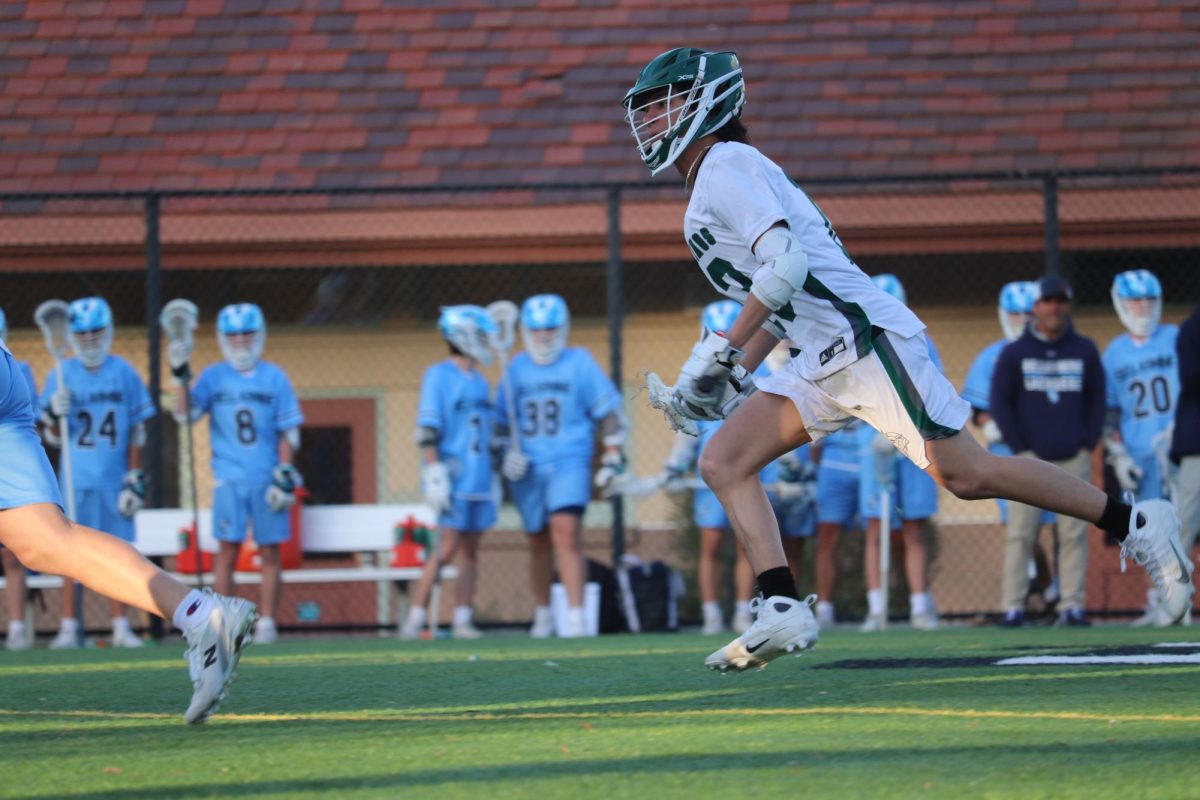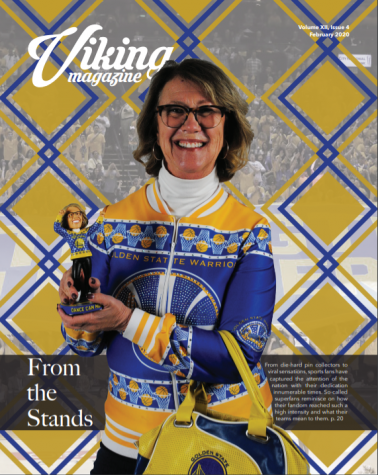The Weight of the Teammate
The role of the teammate in any athletes path to success is incredibly important. Viking explores different kinds of teammates in history through today, as well as the importance each characteristic of a teammate has on the success of individual competitiors and the team as a whole.
December 17, 2018
When stepping up to the plate for his first major league at-bat, Jackie Robinson had plenty on his mind besides the baseball that was coming his way. He felt the end of his bat, and knew there was more on the line than the swing he was about to take.
Despite the fact that Robinson had plenty of courage to step up to the plate and swing, he needed the support of his teammates in order to be granted the opportunity at hand.
Pee Wee Reese and many others are considered to be inspirational teammates that uplift their colleagues to perform better despite adversity and pressure.
In history, Pee Wee Reese is a perfect example of an inspirational teammate in his actions towards Jackie Robinson. Reese was one of the only professional baseball players to even somewhat support Robinson’s claim to fame, and inspired Robinson to continue his civil rights protest despite prominent hatred from the rest of the league and the world.
Within each sports team, there is almost always one player known to lift up all the others. Whether they do it with their calm, inspiring words, or pump up personality, they always share their go-getter attitude to motivate the team.
This player is usually a very cherished teammate that brings a lot of heart. One Paly athlete that stands out with this type of personality is basketball player Annie Niethammer (‘19).
Niethammer is the type of teammate that contributes by “just being there for them and hyping everyone up before games and practices, dancing and making everyone smile,” Niethammer said. “I notice that when the team is on the same page and in the right state of mind is when we work much better together and just making sure everyone is cheering for each other on and off the court.”
These types of players are responsible for making sure the team is always bringing their A-game and their teammate never put their head down when faced with adversity or defeat.
One example of this in professional sports is Draymond Green. Green is infamous for his outgoing spirit that never fails to motivate his teammates.
Stephen Curry refers to him as “the voice” and “spirit of the team, and we kind of feed off of his energy.” Green leads through his words that inspire and fire up players to bring out the best in them.
Although the inspirational teammate is certainly one of the most important members of any team, a certainly popular type of teammate is the teams funniest player.
Generally, this player enjoys the competition and lightens the teams nervousness during a game. Some aspects of this type of teammate include players who either jokingly or seriously compete with all their heart, or put on a show when needed.
Funny players can either be classified as an inspirational teammate or an annoyance to the team, but in most cases, they provide comic relief when necessary and can ease the tension off of the rest of the fellow members of the team. Often times, a team is stuck in a difficult situation, and comic relief can always aid in keeping all the members of a team calm. One dynamic duo when it comes to funny teammates is made up of Shaquille O’neal and Charles Barkley. Both of these two were wonderful teammates who may have not always gotten along with their colleagues, but were great NBA players that benefitted their teams.
They both would make jokes with the opponent and were generally successful in demoralizing and destroying their morale. This, in turn, would benefit the team as a whole, since if the opposition is less inclined to perform well than the other team is far more likely to succeed in their game.
In the Paly athletics world, Will Schlemmer (‘18) is a perfect example of this kind of a teammate.
“Schlemmer is definitely the funniest teammate, ” Marvin Zou (‘19) said.
Schlemmer is always invested in the game as much as possible. Not to mention, he is certainly considered a valuable member of the team whether they are in the middle of a playoff game or having a post-game dinner with the team.
Schlemmer always lightens the mood of the rest of the team and attempts to destroy the spirits of the opposition the best he can, generally with comedic intent. Of course, Schlemer is also very intense during game time and does whatever he can to help his team win.
Another popular funny teammate is George Welch (‘18) of varsity baseball.
“I bring light and a humorous attitude to the team” Welch said, revealing his comedic benefit to the team.
When speaking of his favorite type of teammate, Welch said “anyone but Max”, referring to Viking News Editor Max Jung-Goldberg. In any case, the funny teammate provides plenty of benefits to the aspect of a team.
Another common yet important teammate is the quiet competitor. Often times this teammate doesn’t blatantly support the team, especially compared to some other types of teammates, but this teammate is certainly a valuable member of any team and puts in all their effort towards the team as a whole whether or not they blatantly reveal their support.
One example of a popular quiet player in the NFL is Arizona Cardinals wide receiver Larry Fitzgerald.
Although Fitzgerald is not neccesarily considered silent when competing, he is certainly not the most outgoing member of the team. However, Fitzgerald is certainly one of the most valuable members of the team and still brings an energy and sense of fun for the rest of the team.
Fitzgerald also continually supports his teammates and coaches, complementing their play and morale throughout the season.
For example, during the Cardinals preseason media day, Fitzgerald opened his interview by showing gratitude towards his mentors.
“I was very fortunate to have some great mentors. A father that was always in my life set the example every day at home. Everybody asks me, ‘What was your role model?’ My role model slept 20 feet from me every night. I could always go talk to him and ask him questions no matter what it was about,” said Fitzgerald.
Fitzgerald evidently is very grateful for all he has achieved in life and never comes short of supporting his “role model.”
Fitzgerald also has continued to stay with the Cardinals, despite opportunities for championships and possibly more money in other locations, he stays loyal to Phoenix and continues to fight for a championship.
Fitzgerald also supported his former teammate Michael Floyd after illegal substance allegations.
“Mike is like my brother. I love him dearly.” Fitzgerald said. “I think he’s going to be a great pickup for whoever lands him”.
A well-known Paly athlete with the same tendencies is boys varsity basketball player Marvin Zou (‘19). Although Zou, similar to Fitzgerald, is not the most outgoing player on the team, he still brings a competitive and beneficial spirit to the team and plays a crucial role on and off the court.
When speaking about his teammates and their effect on him and the team, Zou said “I think my teammates have helped me a lot with playing with people who are a lot bigger and taller because there are some giants on our team.”
Zou also classifies himself as a “selfless teammate,” someone who will put the team ahead of his personal interests and goals. In any case, quiet teammates are a common and important aspect of any team and any sport.
A teammate not so commonly found is the one with outstanding numbers. This person’s overall talent and skill bring the team to the next level. When handled correctly, the most valuable player helps the team excel.
A common danger with having a superstar on the squad is making sure that the team still plays as a team. Many times, when there is one stand out player, the team has a harder time playing as a unit, and solely relies on them.
When there is a player as valuable as such, the team must maintain the mentality that one person does not make a team. This creates a very successful outcome for the team as a whole.
One person that encapsulates this description at Paly is volleyball player Amelia Gibbs (‘20). Her statistics are far above the average and she always plays with a team-oriented view.
“The attitude of your teammates can make or break the team” Gibbs said. “I’ve definitely played on teams where the way we got along was our biggest problem, but most of the time my teammates hyping me up when the team chemistry is really good is the best part of playing.”
Gibbs’ numbers show that she acquired a total of 185 kills last fall season, far surpassing the national average of 53.6. Additionally, she got 75 total blocks which is very impressive when compared to the national average of 13.9. Not to mention, she was put on first team for Varsity volleyball despite the fact that she is a sophomore.
Not only does she help the team with her outstanding performances, but contributes as a positive teammate.
“I focus on trying to make my teammates feel good by saying positive things and let the coaches be the ones to give them suggestions” Gibbs said.
A clear professional example of this type of teammate is Michael Jordan. Michael Jordan has won most valuable player in National Basketball Association five times in his career and is arguably the best player the NBA has ever seen.
Not only did he just have personal success, but he used his talent to get wins for the whole team with a total of 6 championships, never having lost in a championship game.
He is accredited with saying, “Talent wins games, but teamwork and intelligence wins championships.”
This is the mentality that is key for the most valuable teammate to have in order to succeed as a whole team, not just as an individual player.
Similar to the teams prodigy, a common personality that shows up on almostevery team is the competitor. This is the teammate that takes the competition of the game to a whole new level. Typically, they are more passionate on the court and their fighting spirit ultimately has a positive impact on the team as a whole.
A Paly student that fits this description perfectly is water polo player Jack Andersen (‘18).
“I try to push myself and those around me to to be the best players that they can be,” said Andersen.
By simply showing up and encouraging others to put in the work, Andersen elevates the level of play for Paly water polo.
An extreme competitor is ambitious. For example, Kobe Bryant used his competitive spirit to fuel his successful career in basketball.
“People just don’t understand how obsessed I am with winning” Bryant said.
This desire to win is what drove Bryant to have such a phenomenal career. He has won countless awards and honors. Although he is retired now, the Lakers retired his jersey because of his amazing contributions.
If the team is ever slacking, the competitive teammate will hold them accountable. All teams need the fiery passion that this player brings to the table. If a team starts to lose this fire, it can be very difficult to maintain the drive and determination it takes to achieve a team’s goals.
Every single team needs a leader. There are times when someone within the team has to step up and take initiative. In crucial moments, it is easy to lose focus or panic; It is the leaders responsibility to calm down the team and guide them back into the appropriate mindset.
One tricky aspect behind being a team leader is that you have to manage the team without micromanaging them, in order to avoid any resentment. This can be difficult if a leader has unrealistic expectations because it makes their teammates feel as if they are under constant scrutiny.
A key aspect behind leading a team is learning to master the art of constructive criticism. Specifically, giving your teammates feedback on small, particular aspects of their game will result in them taking this criticism in a positive way. If the leader criticizes their teammates frequently then the teammate will most likely react negatively to the feedback.
Another responsibility of the team leader is to build every player up to their maximum potential. Whether this is through competition, leading by example or other methods this is crucial to developing the team to its highest level.
A leader also has to establish shared ownership for the results. Most people are familiar with the phrase “win together, lose together” because it makes all players responsible for the outcomes of each game.
The team leader is also responsible for maintaining respect between teammates on and off the court. Coaches do not always pick up on the subtle negative interactions teammates have, so the responsibility for resolving these conflicts tends to fall into the hands of the team captain.
The leader also guides the team towards a common goal. Almost every team goes into each new season with a goal.
For the Paly girls soccer team, the season goal has been the same thing for the past couple of years.
“It was our goal to beat Mountain View because they are our rivals and have been for a long time,” said Claire Moley (‘19). “For all the years I have been on varsity, it has been very back and forth between who beats who during each season.”
Going into that game, Moley said that keeping their season goal in mind helped them to achieve it.
“We went in knowing that this was going to be challenging game, which made us more focused on what we needed to do” said Moley.
When the team completed this goal, there was a feeling of achievement as well as team unity.
Moley also gave lots of credit to the captains of the team, Emily Tomz (‘18) and Ally Scheve (‘18). Without their leadership they couldn’t have had such a successful season. The team ended up getting placed in open division for CCS, got second in league and finished with an overall record of 13 wins, 6 losses and 2 ties.
In any case, all these incredibly important members of the team add some value. Some teams are unable to succeed despite raw talent because the teams morale and chemistry is unmatched by their opponents.
For example, teams like the Lakers and Heat have attempted to create “super teams” that dominate the NBA, but have continually lost to teams with far less talent such as the Spurs simply use to the different kinds of teammates contributing to the team.
These super teams exist in all sports, and are unable to create a locker room environment worthy of winning a championship, due to their lack of varying types of players and teammates influencing the team.
The 2012 Lakers had almost all former MVPs that had no experience handling the team aspect without taking over the game for themselves, and therefore didn’t have all the required teammates an intensive team sport such as basketball requires.
Teammate chemistry also varies amongst different types of sports as well. Individual sports such as tennis and swimming generally don’t require as much teammate chemistry as some sports where the team works as a whole. It is a necessity to have a funny teammate to lighten the mood for the entire team, a quiet teammate to give way to the competitive players, a leader to guide the team to victory and a prodigy to lift the skill level.
Often times, especially in the case of Jackie Robinson, teammates con provide contrasting aid to any individual player’s success. A teammate doesn’t always help the rest of the team, there are times when they worsen the experience of individual players and the success of the team as a whole.
In the case of Robinson, he had a few teammates, especially Pee Wee Reese, who helped him get to where he wanted to be. Yet, some of the other Los Angeles Dodgers were not as supportive.
Although these other teammates may or may not be classified in these generally positive categories of teammates, they did not help Robinson or the success of the team as a whole with their racist beliefs towards the traditional sport of baseball. However, beneficial teammates such as Reese can always overtake the adversity and pressure of any level athletic event.
“It is important to have a variety of different teammates because there is always someone to make you laugh, or push you to be better or to support you. Having different personalities can bring a team together and a tight group tends to perform well and trust each other,” Carly Martin (‘21) said.
This trust is what makes any team successful but it also makes any team a family.












